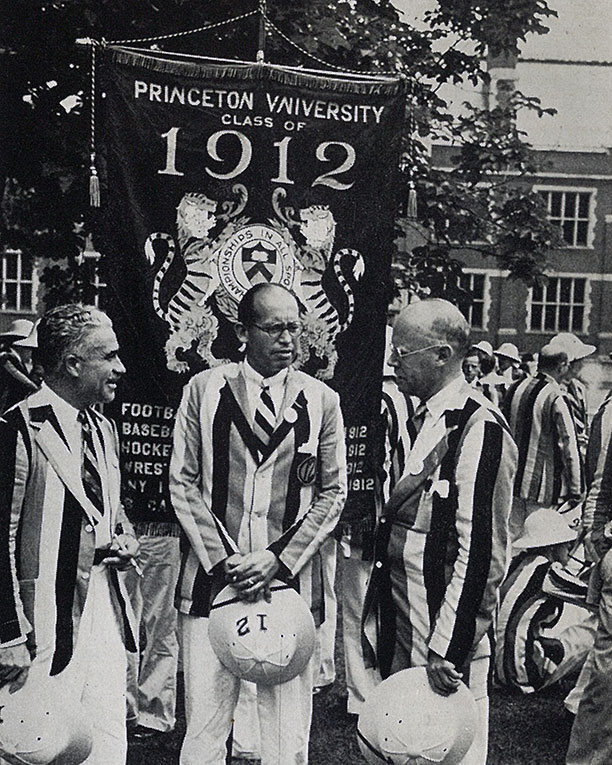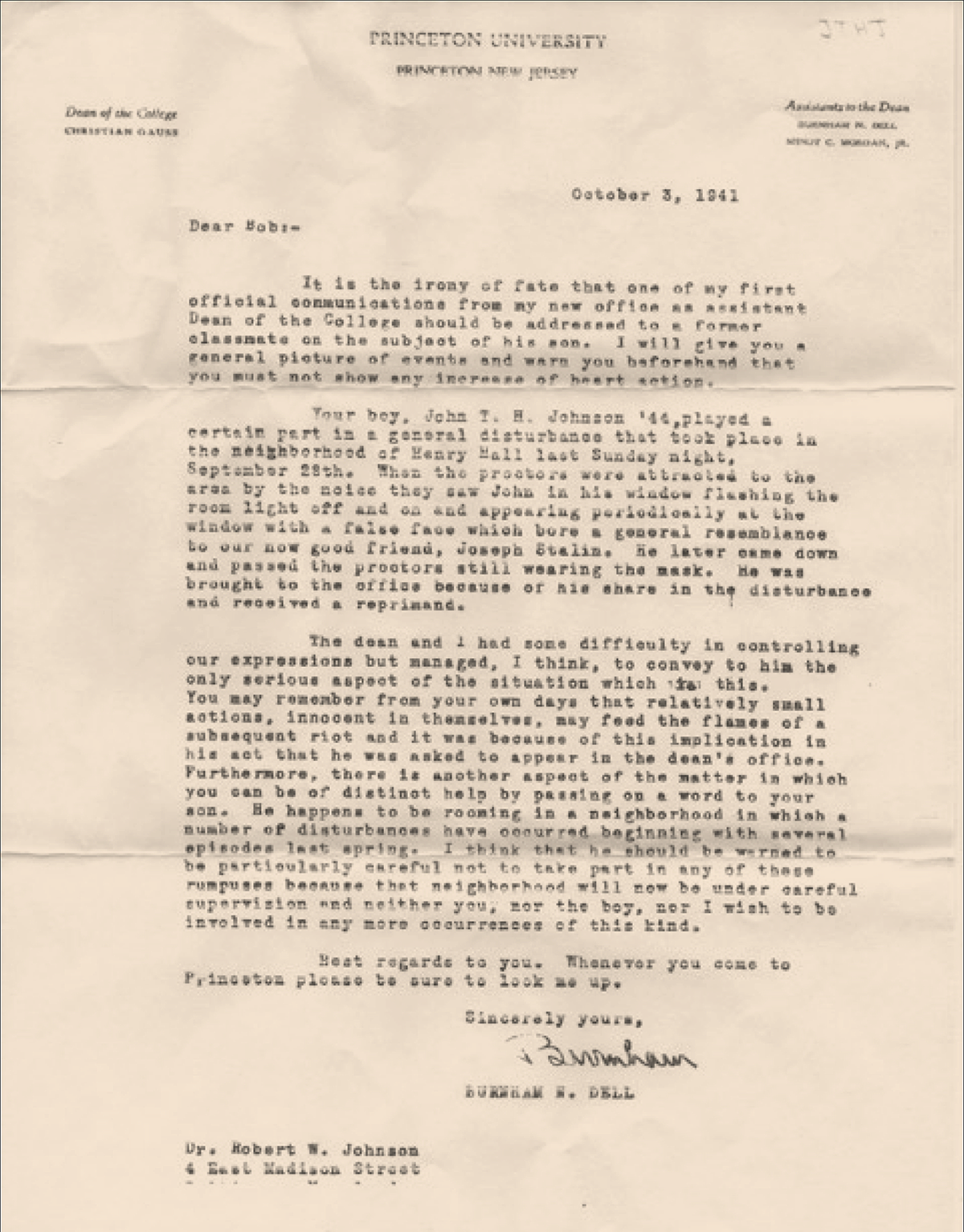“Good authors too who once knew better words,
now only use four-letter words;
Writing prose, anything goes.”
— Cole Porter, 1934
Our story begins in September 1908, when Woodrow Wilson’s seventh freshman class, the great Class of 1912, matriculated at Princeton, which had now been a University for 12 years. The entire undergraduate body had now experienced preceptors and their revolutionary way of teaching — and of ferreting out slackers who were trying to coast by. They had never known a time without departments and academic rigor. Reputedly, the dandies and hangers-on were now often going elsewhere to college (although that’s very hard to document), and those seeking serious education were in the ascendance.
And indeed, the Class of 1912 included some truly notable men. Arthur Holden, familiar to many of us as longtime class president and seven-time winner of the Class of 1923 Cane as the senior alumnus marching in the P-rade, was a highly successful and distinguished architect in New York City with advanced degrees in architecture and economics. He used them to propose and design inexpensive housing as well as large prestige projects, and so ended up working with someone of similar interests: Frank Lloyd Wright, on the Guggenheim Museum. Holden had his own firm for 57 years and was awarded the gold medal of the New York chapter of the AIA. His and his wife’s book collections still grace Firestone Library.
Dean Mathey was likely the most influential. A tennis star — he won the national doubles title twice at Princeton — he was Phi Beta Kappa, and moved quickly into big-time New York finance on graduation. We’ve told the tale of his saving the Princeton endowment in 1929 and through the Depression, and of his legendary 34-year tenure on the board of trustees, including the pivotal committee that named Robert Goheen ’40 *48 president, all while living in Princeton in a house designed by Arthur Holden. Mathey was intensely modest; it was only following his death that Princeton was able to honor him by naming Mathey College. In any fiscal sense, the entire University is his legacy.
Classmate Burnham Dell was Mathey’s doubles partner for the national championship in 1910. He began his career by studying for the ministry at Union Seminary in New York, then serving in World War I as an Army chaplain in France. After that, he was never able to stay away from Princeton for long. He received a Ph.D. in economics in 1933, and became an assistant professor for the remainder of his time there. He was the chair of the newly-created Council on Athletics from 1934 to 1939, then assistant dean of the college, and finally dean of freshmen (can you imagine what second prize was?) prior to leaving in 1943 to serve again in the Army, this time as a colonel in the military administrative structure in England and then in France.
And there was Robert W. Johnson Jr., legacy of a line of Princetonians, who went on to Johns Hopkins for his medical degree, graduated first in his class there, then volunteered for medical service with the British Expeditionary Forces for two years based in London during World War I. He specialized in orthopedic surgery, returned to Hopkins to practice and teach, became a professor and head of his department, and eventually became the president of the American Orthopaedic Association. Both of his sons went to Princeton, and from there to Hopkins Medical School. His daughter married one of their classmates.
And indeed, it is in that generation that our story continues. Each year, you recall, our December column hangs around online here at Your Favorite Periodical for a few weeks like a datebook packed with too many seasonal soirees, that seemingly just doesn’t know when to quit. So we call on Princeton’s history to relate something of a little inspiration (and perhaps rumination) to accompany those many cold winter nights and warm winter toddies, including the warm martinis Johnson told classmates was the only cure for a head cold.
Our 2017 holiday gift is actually memorialized in a single sheet of paper (well, actually there’s a literal carbon copy in the Archives, but…) that was recently received here at PAW HQ, then wended its way from CINCPAW all the way here to Cobweb Corner, where its beauty was most appreciated. It came from Polly Johnson Bayrd, granddaughter of Robert Johnson Jr., and recalls that Great Class of 1912, the class of the architect, the professor, the financier, and the surgeon, all of whom were likely at Dean Mathey’s home for their 29th reunion in June 1941.
Three months later, on Sept. 28, there was “a rumpus” at Henry Hall that drew the proctors. So inconsequential it wasn’t even mentioned in the Prince, we know of it by virtue of Bayrd’s kind gift, which in the best ecofriendly tradition we regift to you here:
The letter reads:
October 3, 1941
Dear Bob:—
It is the irony of fate that one of my first official communications from my new office as assistant Dean of the College should be addressed to a former classmate on the subject of his son. I will give you a general picture of events and warn you beforehand that you must not show any increase of heart action.
Your boy, John T.H. Johnson ’44, played a certain part in a general disturbance that took place in the neighborhood of Henry Hall last Sunday night, September 28th. When the proctors were attracted to the area by the noise they saw John in his window flashing the room light off and on and appearing periodically at the window with a false face which bore a general resemblance to our now good friend, Joseph Stalin. He later came down and passed the proctors still wearing the mask. He was brought to the office because of his share in the disturbance and received a reprimand.
The dean and I had some difficulty in controlling our expressions but managed, I think, to convey to him the only serious aspect of the situation which is this. You may remember from your own days that relatively small actions, innocent in themselves, may feed the flames of a subsequent riot and it was because of this implication in his act that he was asked to appear in the dean’s office. Furthermore, there is another aspect of the matter in which you can be of distinct help by passing on a word to your son. He happens to be rooming in a neighborhood in which a number of disturbances have occurred beginning with several episodes last spring. I think that he should be warned to be particularly careful not to take part in any of these rumpuses because that neighborhood will now be under careful supervision and neither you, nor the boy, nor I wish to be involved in any more occurrences of this kind.
Best regards to you. Whenever you come to Princeton please be sure to look me up.
Sincerely yours,
Burnham N. Dell
This misadventure has all the makings of a telenovela as written by Woody Allen. The two distinguished classmates, the economics professor and the surgical professor; the sophomoric sophomore son of one in the office of the other; the Josef Stalin mask; the evildoers in the tawdry Henry Hall neighborhood.
But of course (you knew there was an “of course” coming here, right?) that’s not really the message we want to consider, that’s just the surface distraction. The import of Burnham Dell’s letter is its deep, personal caring and detail of the old Princeton, where classmates watched out for their classmates’ sons, where a Stalin mask qualified as a rumpus, and where benevolent guidance from on high, including the deans, professors, and even proctors, was the unspoken contract under which the community thrived. The time and effort to conduct the interview, issue the warning, then construct a full-page letter (with carbon copy!) speaks to priorities of the college then; even considering all the shortcomings of in loco parentis as policy, who’s to say kindness and concern are bad for 19-year-olds?
And in a more melancholy vein, Dell’s letter represents something else. Ten weeks after the rumpus, the Empire of Japan bombed Pearl Harbor. This dean’s note is, jarringly, the last gasp of a Princeton never to be seen again.
Take our dastardly evildoer Josef, uh, John Triplett Hextall Johnson ’44, for example, always known as Jerry. Like much of his class, at the outbreak of war he immediately accelerated his work, graduated magna cum laude in February 1943, went to Hopkins Med as an Army trainee, where he finished his MD in 1946, then joined the Medical Corps. An orthopedic surgeon like his dad, he taught at Hopkins and worked at local free clinics, as well as with CARE/MEDICO in Tunisia. He was a hospital administrator and, for 25 years, the editor of the Journal of Bone and Joint Surgery. He retired in 1989. Jerry, Polly’s father, died this April 3 at age 94, seemingly having successfully outgrown his rowdy proclivities from his days in lurid Henry Hall.
The fate of the Class of 1912, however, is a bit of a different story. We saw last time what the campus became in the aftermath of World War II with its returning veterans, along with its bicentennial, its new Firestone Library, and its drive to join the world’s elite universities. It was far larger, more goal-driven, businesslike, polished. The time for kindly deans’ letters about Halloween masks and “be sure to look me up” was past.
Now, we might try to attribute that to naivete on behalf of the Class of 1912, but that’s not it at all; both Dell and Johnson were World War I veterans and they knew the evil out there, far too well. But I suspect they also knew Princeton as a place of warm memories and limitless personal potential, and hoped against hope it could remain that, at least partly a buffer against the brutal intrusions of the greater world. And if we are honest with ourselves, I think we often desperately wish that too, for ourselves, for our offspring classes, for the magnificent faculty, for all who carry Princeton’s name. Or why Reunions, say?
So let’s allow Polly’s gift (and my regift, you’re welcome!) — that single sheet of paper from Oct. 3, 1941 — to be a gentle reminder of the best we all can be, and how it would be a fine holiday blessing if a little of Burnham Dell 1912 and his classmates infused us all. God bless us, every one.
Dei sub numine viget.













2 Responses
George L. Bustin ’70
8 Years AgoAnother warm, enlightening...
Another warm, enlightening and remarkable piece of Princetoniana — thank you, Dr. Lange. We also had the occasional rumpus in Henry Hall in the late '60s, but so far as I know, no assistant dean troubled to write home about it.
Tom Swift ’76
8 Years Ago“Relatively small actions...
"Relatively small actions ... may feed the flames of a subsequent riot ..."
What a lovely turn of phrase. Here's to those "small actions," and to the occasional "riot."